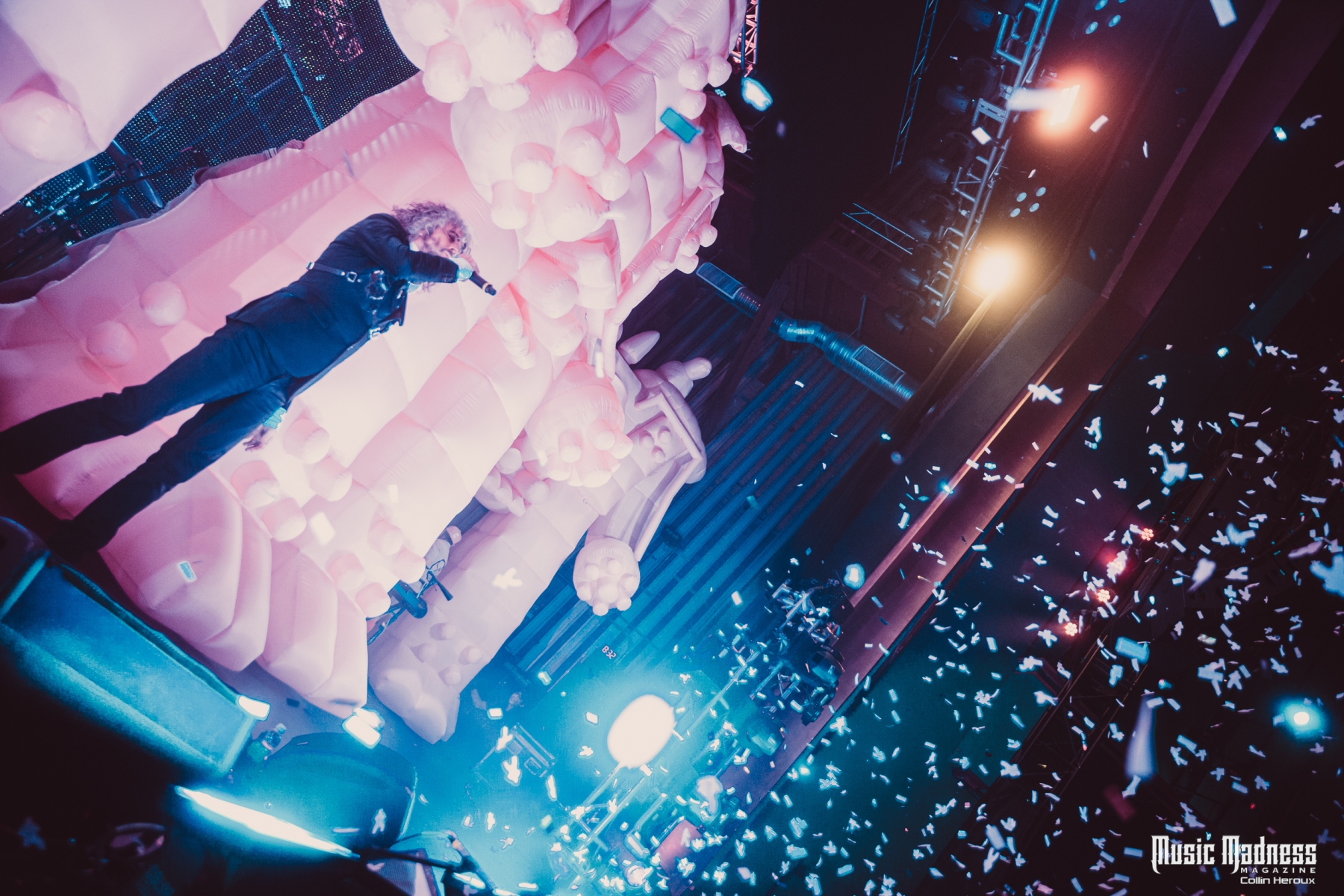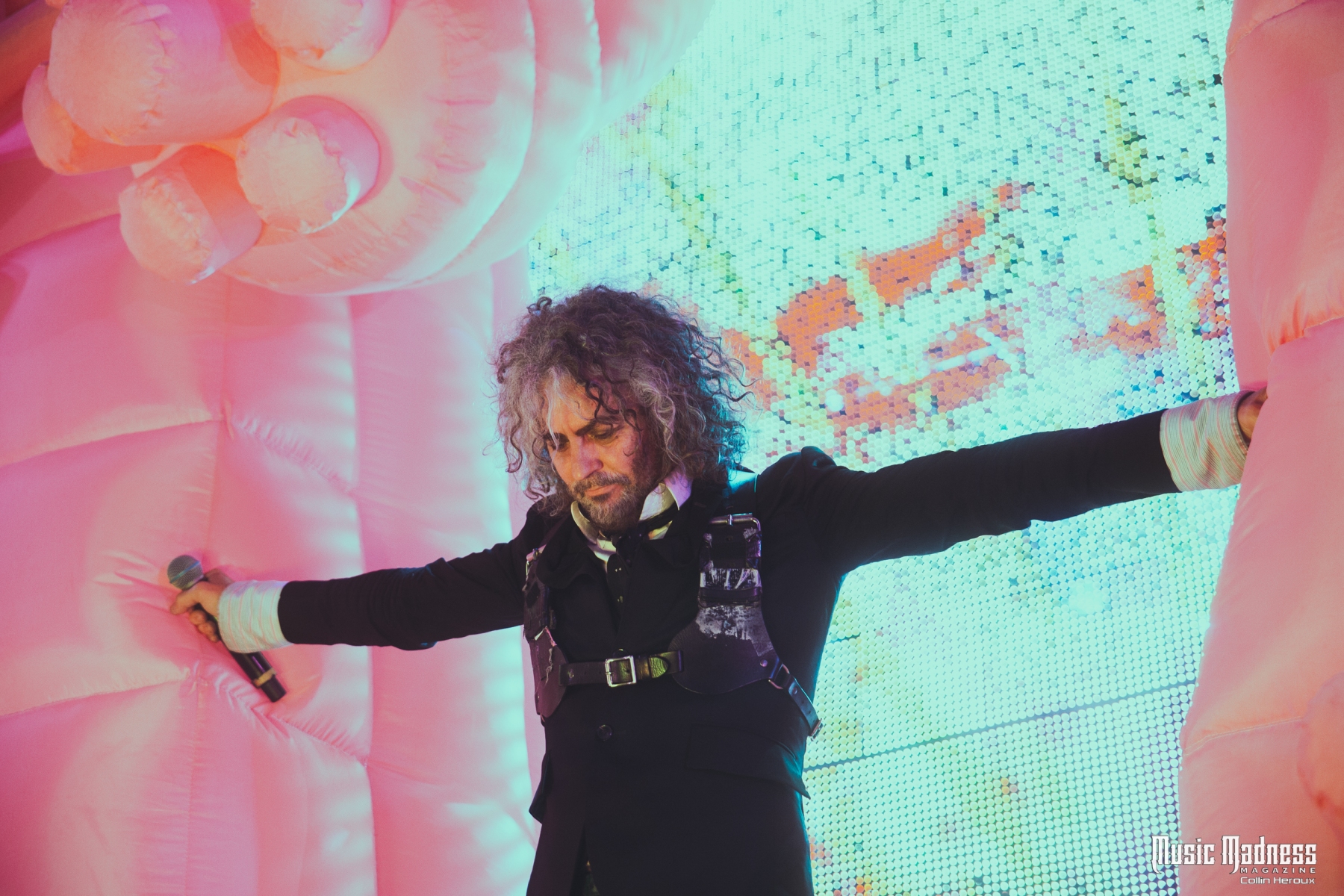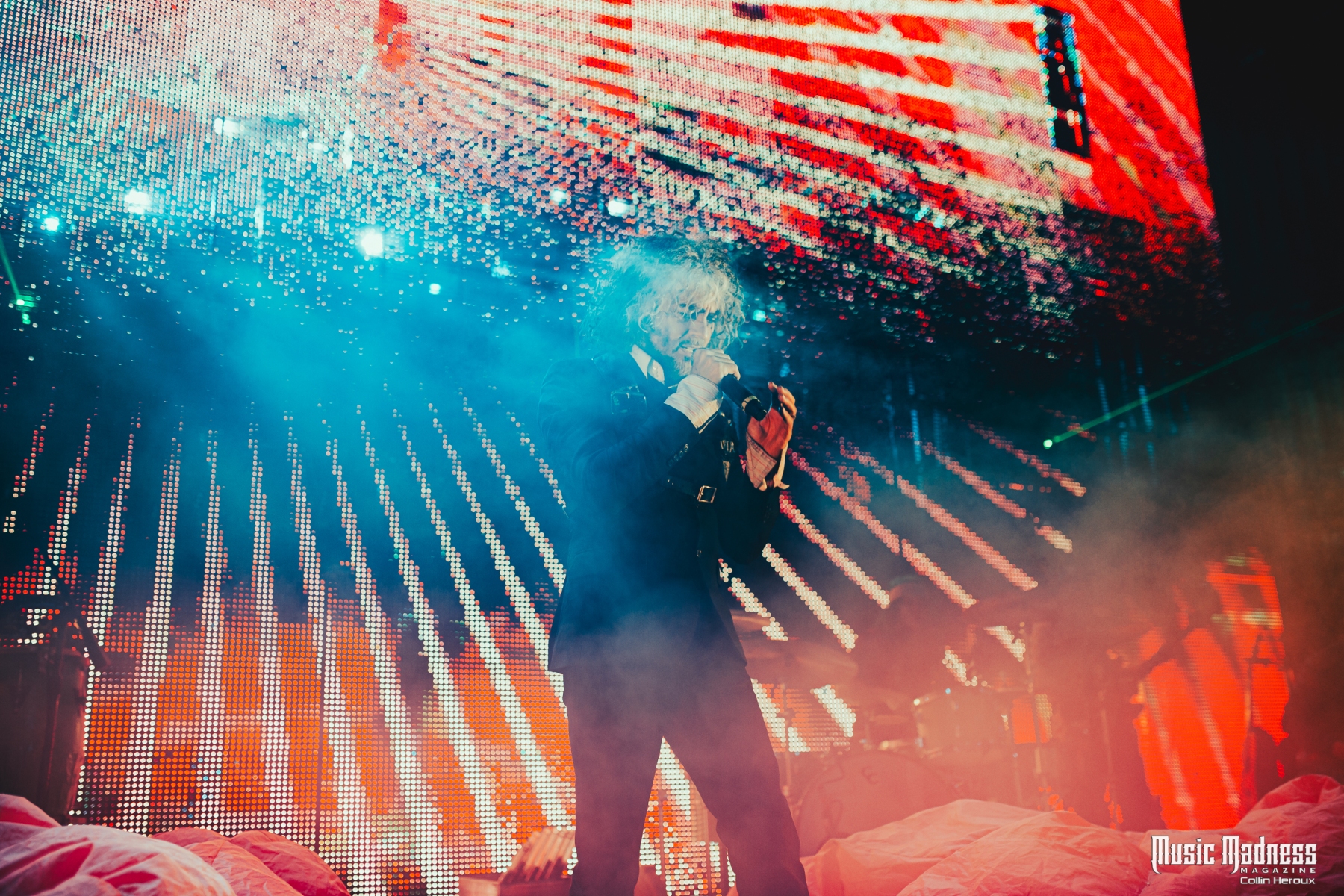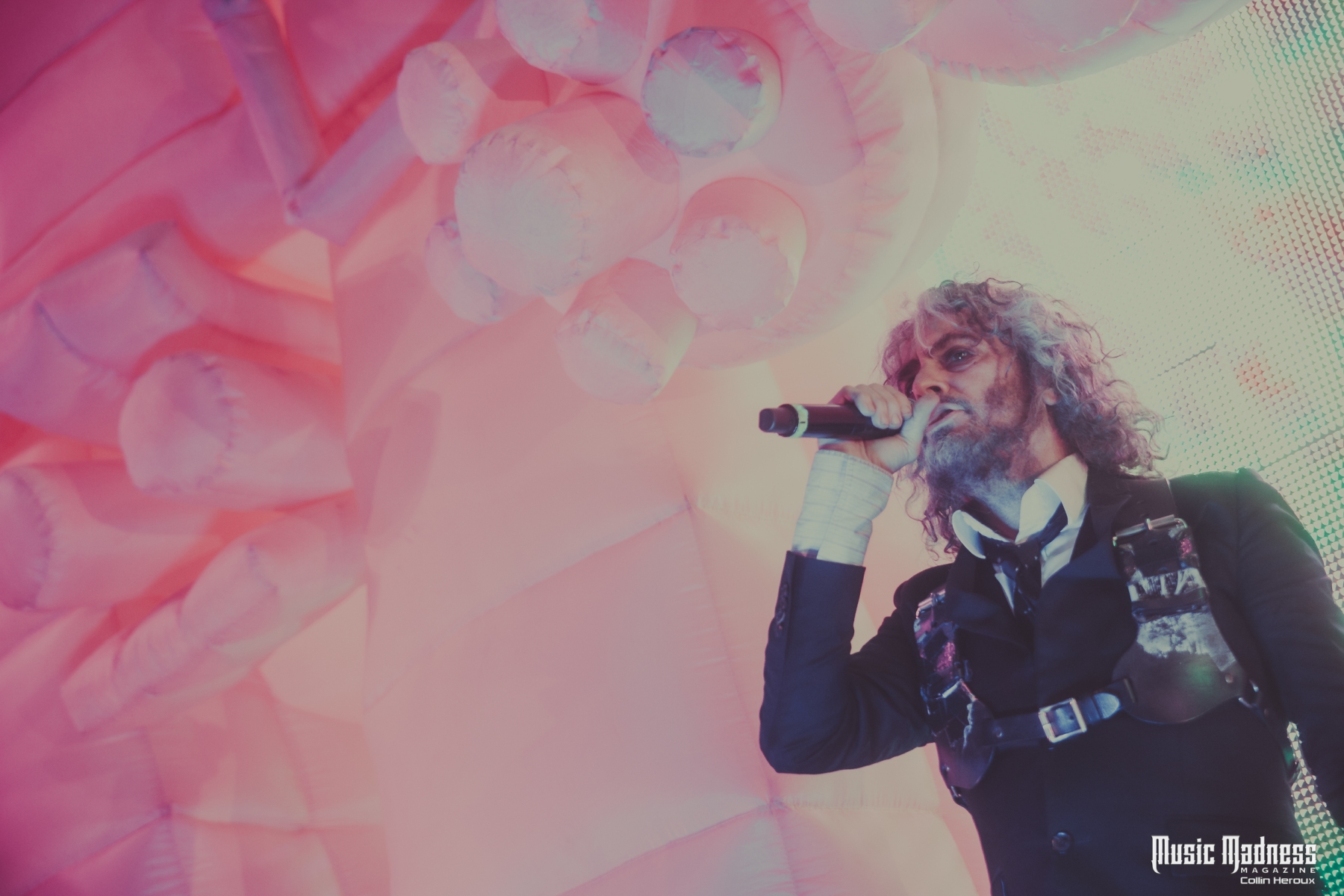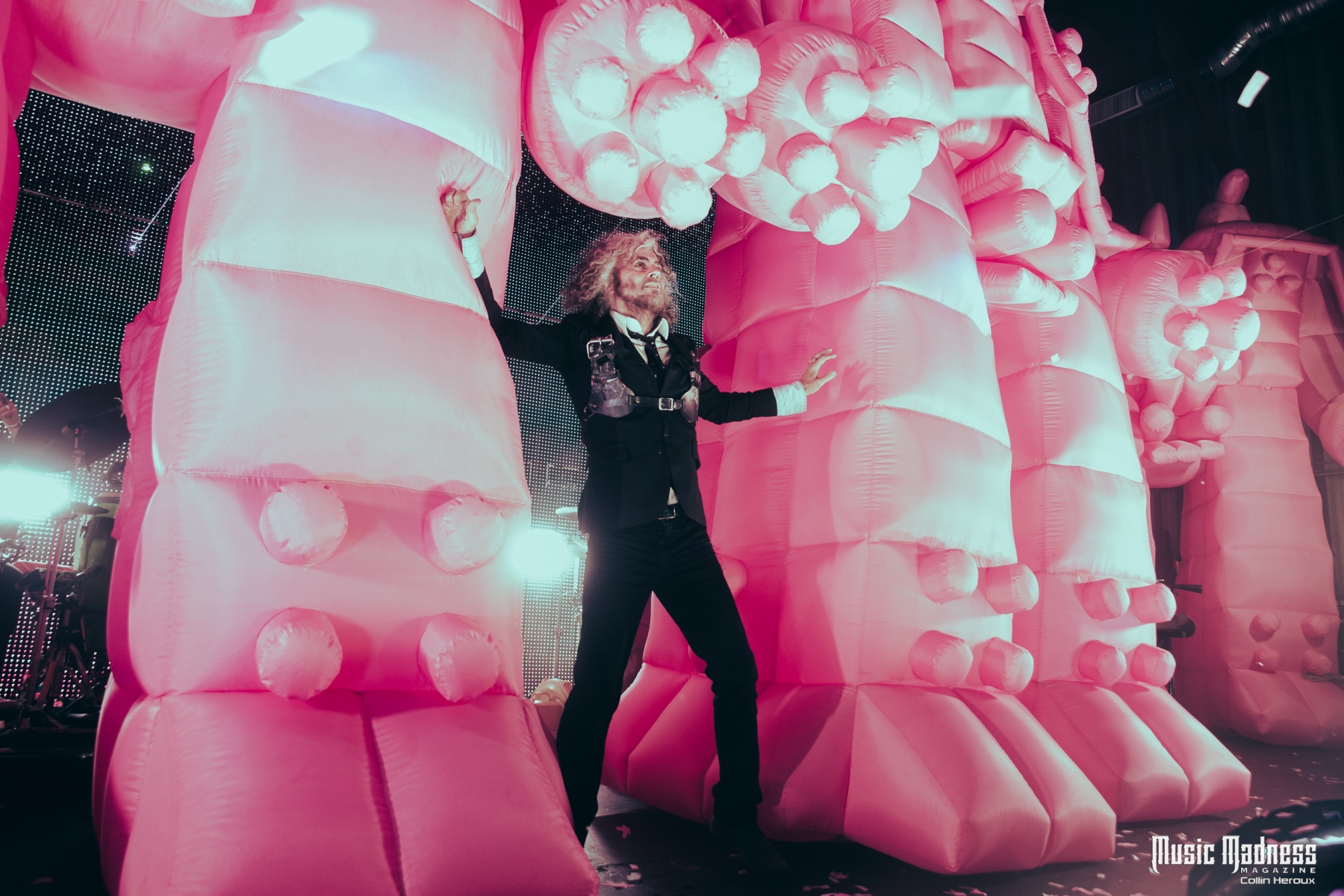
I’ve never once shared space in the photo pit with a cannon of any sort, but there’s a first time for everything as I wait for The Flaming Lips to take the stage at College St. Music Hall in New Haven, sold out even despite the summertime dearth of college students. The Lips are the only band playing on the night; an unseen announcer starts a countdown every minute til the show starts with capital-F Five, booming through the room and interrupting John Cale’s ‘Fear is a Man’s Best Friend’ as it plays over the PA. And this is not just any show the Connecticut audience is in for – this is an anniversary celebration of one of the band’s most memorable and most-loved albums – Yoshimi Battles the Pink Robots. They’ve gone all-out on a spectacle for its double-decade anniversary, hence the massive, two-headed confetti cannon at either side of the stage, only two mere pieces of the kit that the band has brought along for their show.
With the entire first portion of their show consisting of Yoshimi played back-to-front, the stage is dominated by four of those pink robots, giant inflatable things operated and inhabited by people in mushroom hats. They dwarf singer Wayne Coyne as he stands center-stage, and often obscures the rest of the band – there are at least as many crew members making the whole stage show work as there are people actually playing music onstage, and it pays off. The pageantry is unparalleled, and it’s hard to think of a touring band that dedicates themselves to this kind of craft so thoroughly. While Yoshimi is not a concept album, the first four songs are the most interconnected of the bunch. After “fighting” the nearest pair of gargantuan robots a bit during this movement, Coyne disappears briefly and returns with a giant yellow ball, which he hurls into the crowd, following it up with long tubes of confetti spewed out of long tubes erupting from curling wisps of nitrogen – all in addition to the salvos from the larger cannons on the ground. The air is alive with particles of all kinds, lights cast out on the audience as powerfully as they are on the band.
Despite the celebratory air of the show, Yoshimi is a dualistic work, as are most of the things the band have created in their roughly forty years of existence. Able to oscillate effortlessly between the extremes of acoustic and electronic, foundational funk, or total ambience – the band’s psych-rock compositions have always looked inward, even as their songs evoke the cosmic and their live performances seem to embody the spirit of extroversion. ‘Flight Test’ starts the record off with ontological questioning, and they move on in ‘Sympathy 3000-21’ to pondering the nature of love, a puzzle far more personal but equally vital in scope. That song quickens in its final moments to bridge into the two-part title track(s) of the record, splicing the classic with the modern from its beginning with acoustic guitar fed through glitchy alterations, then into its second phase which unleashes a heavy bassline and drums crashing loudly through the din. The recorded version features some crowd noise, and the audience in Connecticut is happy to take on that role – though funnily enough, their lower noise level between each song almost seems too courteous for Coyne, who stirs up the air with his arms to keep the ruckus going.
‘In the Morning of the Magicians’ provides a bit of a temporary comedown, an acoustic-led return to the quandary of love, something echoed in ‘Ego Tripping at the Gates of Hell’. Soon the band brings out a massive disco ball to the center of the stage, its reflected light the only source of illumination for a while. The compositional detail here, and throughout the night, is especially a testament to the creativity of Steven Drozd, the longest-standing member of the band aside from Coyne. Even for those not well-acquainted with the Lips, the name likely rings a bell from somewhere or another. It could be his collaborations with Maynard James Keenan of Tool, or perhaps one would have encountered him through his feature with Coyne paying tribute to the music of David Lynch’s works (or one of the many other places he’s cropped up through the years). The Flaming Lips have always embraced the spirit of collaboration: on their most recent LP, American Head, they took Kacey Musgraves through a funkily xylophonic soundscape; they also made much of a double album alongside none other than Miley Cyrus. Released in 2012, Heady Fwends was an entirely collaborative work, whose high points include a delightfully fuzzed-out cut with Jim James of My Morning Jacket, as well as a particularly verbose Nick Cave, still vocally on his Dig, Lazarus, Dig!!!-era shit, so to speak.
‘It’s Summertime’ touches somberly on something many in attendance may be feeling this August – the disconnect between the gorgeous orange days outside and the sadness we may all still feel within. “When you look inside, all you’ll see is a self-reflected inner sadness,” Coyne proclaims. It’s not exactly novel territory for psych-rock to opine that the self is the root – or a root, at least – of woe, but he may just have a point that is ever so difficult to stomach. The narrator of ‘Ego Tripping’ notes, seemingly from a point of hindsight, that while he was wanting someone’s love, “all the other love around [him] was just wasting away.” From this point forward, the album gives itself over in its final stretch to simple but profound truths and love; Coyne sings from underneath the image of a rainbow during ‘Do You Realize??’, and the album’s final lyrical song declares: “All we have is now”, its two-in-one conjunction of main characters internalizing this notion as they do their own ends. The giant robots inflate one final time for the instrumental ‘Approaching Pavonis Mons by Balloon’, whereupon Coyne plays a trumpet for one of several times throughout the evening. He lifts his hand up in a fist to mass applause as the album and the first half of the night conclude, then darkness falls throughout the music hall as we await what’s next.
Returning to the fold, they invigorate things right away with another one of their many tracks that has more than stood the test of time. ‘She Don’t Use Jelly’ stands in contrast to much of Yoshimi in the sense that it’s gleefully unconcerned with bigger notions, instead a triptych of people who are just deeply, but harmlessly, weird. It recalls some artifacts of The Beatles’ psychedelic era, and during the song the balloon that was tossed about earlier returns with about a dozen of its closest friends and relatives. They bounce throughout the space in the glow of the massive abstract projections on the huge LCD screen that backs the band, and when they inevitably pop, it’s revealed that the balloons are filled with further confetti, raining down localized pockets of paper on those beneath. There’s almost too much going on to keep track of; the lighting changes with each track, sometimes bathing the crowd, others restricted to laser beams. Coyne at one point dons a onesie bearing the likeness of Wonder Woman, the plumes of nitrogen from the big cannons (as opposed to the small cannons from earlier, which is a funny distinction to need to make) wafting across the stage each time they fire their little rectangular payloads up towards the ceiling. Many tracks in this second half of the night are drawn from At War with the Mystics, but the band generally moves all around their discography for this portion, alighting as well on their cover of Madonna’s ‘Borderline’, a result of their longstanding partnership with Warner Records. ‘Pompeii am Götterdämmerung’ plays the role of the closer for this second set, its fuzzy through-line providing a fierceness and gravitas that such a culmination ought to have. A handful of times through the night Coyne has picked up a powerful handheld spotlight and shone it around, and here he whips the light by its long cord above his head. Much of the song is wordless, but the vocalizations are no less powerful for it, and once again the stage and room go dark, though only for a time.
In their final emergence of the night, Coyne appears encased in a plastic bubble. It’s a practice with a long history for Coyne, but was famously televised in a pandemic-era performance of ‘Race for the Prize’, when the entire band and audience got the Jake Gyllenhaal treatment to enact one of the only concerts that took place in the latter half of 2020. While he doesn’t go crowd-surfing on this particular night, this duo of tracks from The Soft Bulletin – their 1999 album which stands alongside Yoshimi as one of their most vaunted pieces of work – is the perfect way to end the show. The confetti cannons fire one final time, and Coyne exits his bubble to retrieve a huge conglomeration of balloons that reads, “FUCK YEAH NEW HAVEN”, which is summarily tossed to the crowd. The band makes one of these for each city they visit, part of their absolute refusal to let the spectacle cease until the very last. By the end of it all, it truly feels like The Flaming Lips have delivered on their implicit promise of cosmic scale twice or thrice over; though while all the gorgeous thought and effort that has clearly gone into their show puts the gig over the top in terms of what a concert ought to be, even the music alone would have done so on its own. That said, almost nothing can beat the sight of a kid holding the “F” balloon from the final song and carrying it across the New Haven Green afterward – it’s a little reminder for me that, even though I’ve seen hundreds of concerts, bands like The Flaming Lips bring together their fantastic music and live production to form core memories in the minds of concert-goers yet to bloom. And even sitting there on the barricade, listening to John Cale and waiting for the show to start, I’m looking at a hulking metal cannon – and that’s pretty cool.




